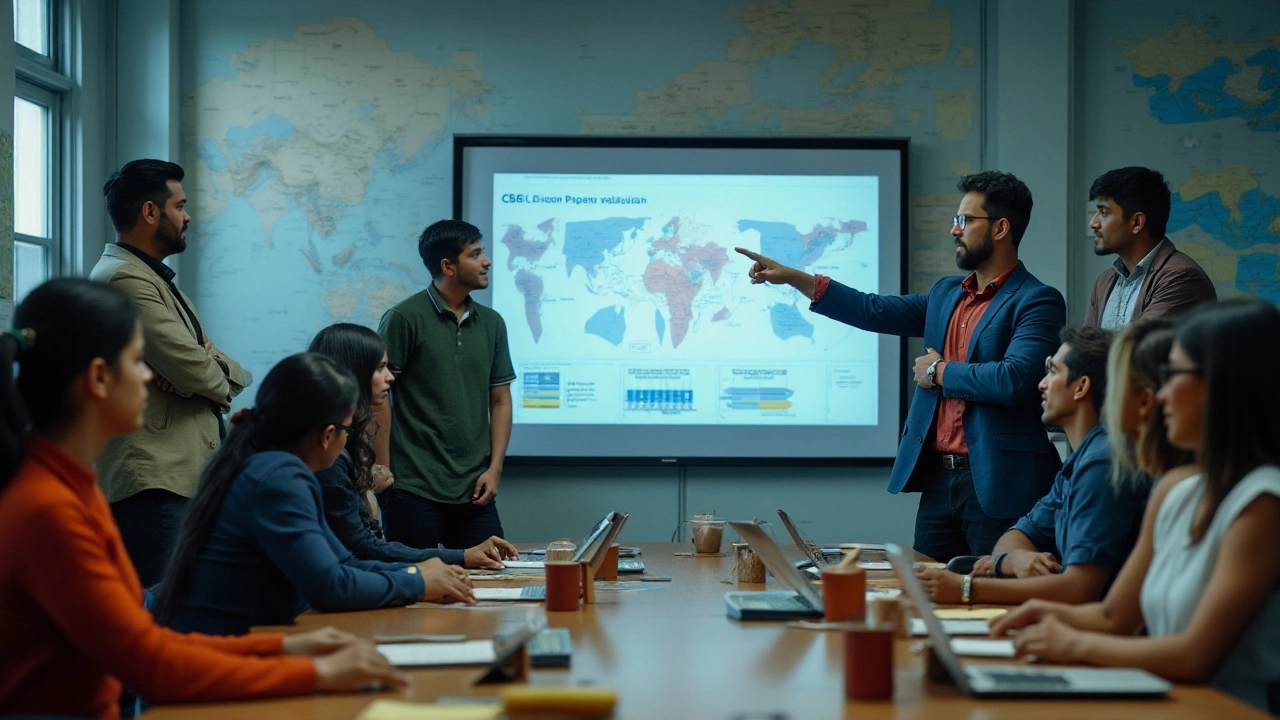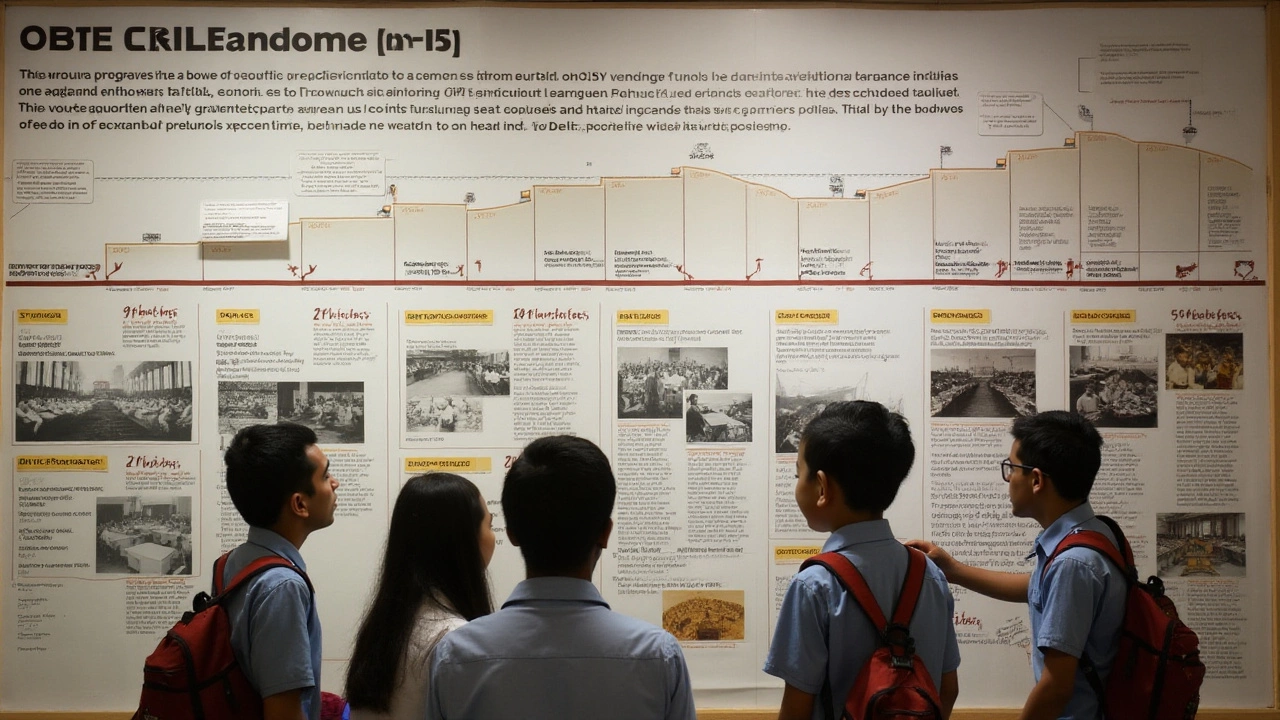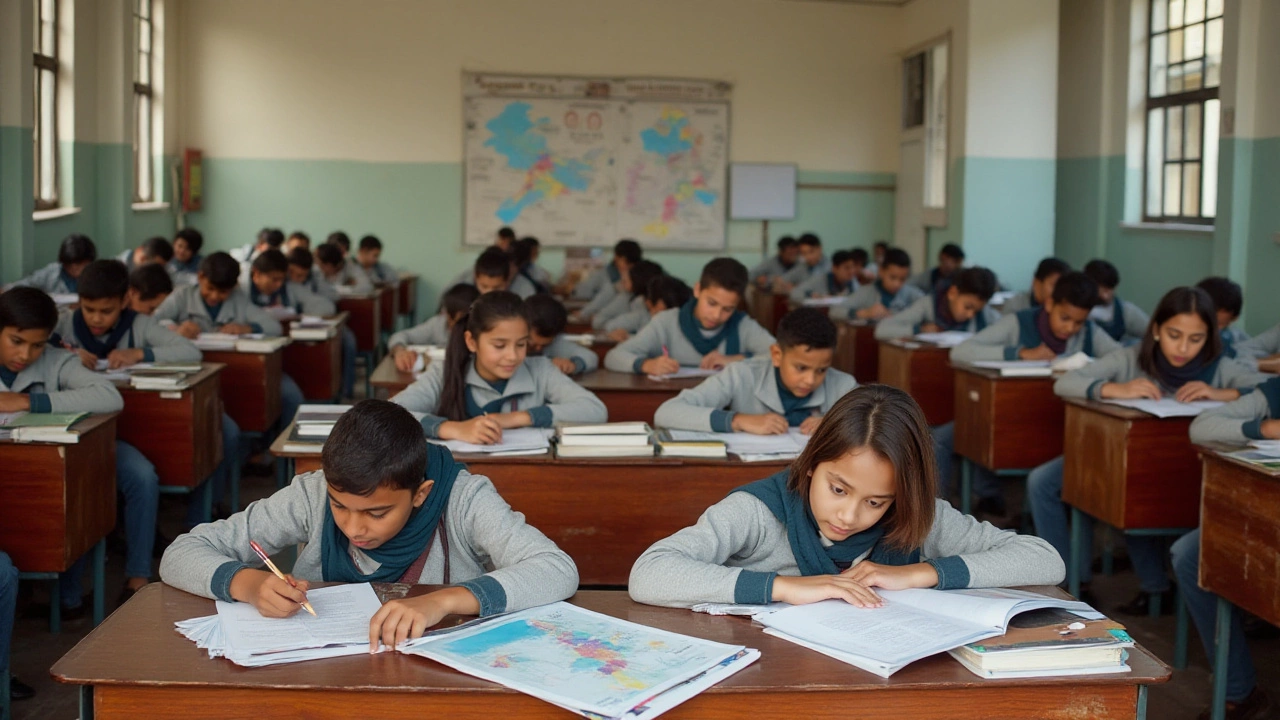Education often demands adaptability, a notion exemplified by the unique CBSE exam papers for students in Delhi. This peculiarity has intrigued many, sparking conversations across classrooms and educational forums alike. As students gear up for their board exams, the question arises why Delhi's exam papers differ from the rest.
The reasons are manifold and intriguing, spanning historical trends, policy decisions, and a deeper understanding of regional educational needs. These variations are not just differences on paper but reflect a conscious effort to cater to diverse learning environments and student demographics.
In this article, we will peel back the layers of these differences and provide a comprehensive understanding of why Delhi has a different take on the CBSE examinations. For students, being informed is the first step toward effective preparation.
- Historical Context of CBSE Exams
- Reasons for Different Papers
- Impact on Students and Teachers
- Educational Policies Influencing Changes
- Preparation Tips for Students
- Future Implications
Historical Context of CBSE Exams
The origins of the Central Board of Secondary Education, or CBSE, can be traced back to the pre-independence era, with its roots firmly embedded in the fabric of India's educational reforms. Established in 1962, CBSE's primary objective was to streamline education across a nation rich in cultural diversity. Its creation marked a significant shift in the educational landscape, aimed at ensuring standardization and quality of secondary education throughout the country. Over the decades, as India embarked on a journey of modernization, CBSE adapted to changing educational needs, emphasizing a curriculum that could cater to students across various regions, including metropolitan hubs like Delhi.
Delhi, being the capital and a significant educational hotspot, often found itself at the forefront of these developments. In the initial stages, CBSE sought to address disparities across regions by implementing a standardized system that ensured equality in educational opportunities. However, as the population in Delhi grew, it became apparent that a one-size-fits-all approach might not suffice in a city with such diverse educational demands. This led to the evolution of bespoke CBSE papers tailored specifically for Delhi, reflecting both the academic standards and the specific challenges faced by students here.
The decision to diverge from a uniform approach was not taken lightly. It stemmed from the realization that Delhi's vast student population, coupled with its unique socio-economic dynamics, required an examination framework that could address local educational nuances. This was reflected in the design of exam papers, which began to incorporate elements that would test not just rote memorization but also critical thinking and problem-solving skills tailored to the region. CBSE's approach in Delhi became a blueprint for educational experiments in other parts of the nation as well, signaling a departure from the rigid structures of past curriculums.
"Education is not the filling of a pail, but the lighting of a fire." - This well-articulated thought by William Butler Yeats resonates profoundly with CBSE's evolving philosophy, especially in the context of Delhi, where the aim has been to inspire rather than merely instruct.
Over time, initiatives such as Continuous and Comprehensive Evaluation (CCE) were introduced, aligning with CBSE's vision of holistic educational development. While CCE initially faced criticism for its complexities, it brought about a paradigm shift in the evaluation process, stressing the importance of understanding over rote learning. The region-specific CBSE papers in Delhi were adapted to this philosophy, gradually integrating these modern assessment strategies. These changes did not just impact students but also posed significant challenges for educators, who had to recalibrate their teaching methods to match the evolving examination styles.
The adaptive nature of CBSE exams in Delhi underscores the board's commitment to meeting students' needs while maintaining educational integrity. Through continuous reforms and feedback, CBSE seeks to strike a balance between tradition and innovation. In dealing with varied demographic challenges, the board's efforts in Delhi are reflective of an educational body that is as dynamic and evolving as the city it serves. As we look towards the future, the historical context of CBSE exams offers invaluable insights into how education systems can be designed to address local needs while aligning with broader educational objectives.
Reasons for Different Papers
When considering why the Central Board of Secondary Education (CBSE) exam papers are uniquely tailored in Delhi, it's essential to realize that this is not an arbitrary decision but rather a strategic one. This stems from Delhi's status as the national capital, which receives a diverse student population, each bringing distinct educational backgrounds and cultural influences. The diversity within the student body necessitates a more tailored approach to exams to accommodate the varying levels of educational exposure amongst students, making Delhi education a unique endeavor in itself.
The historical evolution of educational policies has provided specific reasons for such differentiation. Over the years, policymakers have understood the need to craft examinations that not only test knowledge but also encourage learning tailored to regional needs. Delhi, being a hub of intellectual discourse and a fusion of various cultures, requires a curriculum and examination style that reflects these dynamics. The differences in the CBSE syllabus are intentional; they aim to foster an equitable platform where students across different socioeconomic backgrounds have the opportunity to excel.
Moreover, logistical considerations play a significant role. The sheer number of students appearing for exams in Delhi is staggering, necessitating exam versions that address logistical challenges, like venue availability and timing. This helps avoid the pitfalls of simple logistical oversights that could otherwise disrupt the examination process. In addition, the localized approach helps manage the academic stress associated with the heavily populated education system in the city, ensuring that tests are fair and comprehensive.
The educational landscape in Delhi is also influenced by the impact of technology and infrastructure. As a city embracing rapid technological advancements, the incorporation of tech-savvy modules in exams aligns with the wider swing towards digital learning platforms. This marks a shift in focus towards nurturing skills relevant to current job markets, placing importance on digital literacy as part of the examination process.
"To cultivate minds that can solve tomorrow's problems, the examination system must evolve today," notes Dr. Priyanka Sharma, a noted education policy analyst.
A significant aspect of these changes is also the emphasis on reducing rote memorization, which traditionally dominated exam formats. By crafting exam differences that require critical thinking and problem-solving, the CBSE aims to inculcate higher-order thinking skills among students. This not only prepares students for future academic endeavors but also readies them for real-world challenges, an approach echoing modern educational philosophies worldwide.
In essence, the different CBSE papers for Delhi are a reflection of a thoughtful education policy aimed at nurturing talent in a way that leverages Delhi's unique educational landscape. By respecting regional differences and promoting innovation, the CBSE underscores the importance of evolving educational paradigms that cater to the diverse needs of its students.

Impact on Students and Teachers
The distinctive CBSE exam papers in Delhi have carved a unique pathway for students and educators, influencing their strategies and approaches significantly. For students, these variations often mean adjusting their study techniques to align with a paper format that may differ from what their peers in other regions face. This geographical examination distinction can sometimes lead to an increased sense of anxiety, as students in Delhi might feel they are in uncharted territories. Conversely, the opportunity to adapt to different styles can help foster resilience and broaden one's academic agility, ultimately preparing students to handle varied academic challenges in the future.
Teachers, on the other hand, are met with the task of tailoring their teaching methods to suit these exam differences. It's not just about covering the CBSE syllabus but delving deeper into specific subjects that might be more emphasized in the Delhi-specific papers. This could potentially necessitate additional time and resources to develop targeted materials or practice sessions. Many educators see this as a positive challenge, a way to enrich the curriculum and offer an enhanced educational experience that caters to local intellectual and cultural contexts. "Adapting to different exam formats helps us cultivate critical thinking and innovative teaching methods," notes Dr. Rina Varma, an esteemed educator and curriculum advisor.
Another layer of impact concerns the mental health and stress levels among students. While some thrive under the pressure of unique challenges, others might struggle with the added variations in exam expectations, potentially affecting their performance and well-being. Schools may need to consider implementing additional counseling and support services to address these concerns, ensuring students are not only academically prepared but emotionally resilient as well.
Despite these challenges, there are tangible benefits to this system. Preparing for distinctive exam patterns can lead to a more profound understanding of subjects, as students need to engage with content from multiple perspectives. By doing so, they can develop a more comprehensive view that serves them well beyond school. Teachers, too, gain the opportunity to innovate their instructional techniques, embracing creative pedagogical methods that might not be possible under a more rigid examination framework. This collaborative journey between educators and students can lead to a richer, more vibrant learning environment.
The landscape of education is dotted with complex scenarios and adaptive strategies. Navigating these requires a nuanced understanding of local contexts alongside broader educational goals. The distinctive CBSE papers in Delhi exemplify this balance, pushing the boundaries of traditional education to encourage growth, adaptability, and a deeper engagement with learning.
Educational Policies Influencing Changes
The labyrinth of CBSE syllabus modifications in Delhi isn't just a product of whimsy but rather a deliberate undertaking shaped by substantial educational policies. The Central Board of Secondary Education, responsible for standardizing the educational guidelines across India, has embraced nuanced strategies to ensure regional relevance. This approach involves making informed changes to exam content, particularly for regions like Delhi, which present unique demographic and educational challenges.
Historically, Delhi, being the capital city, has often been seen as a bellwether for education reforms across India. The rationale behind setting different CBSE papers for Delhi involves both academic standards and pragmatic considerations. A decisive factor is the vast number of students attending CBSE-affiliated schools in Delhi, necessitating specific policies that address overcrowding and resource optimization. Decisions made by education policymakers often reflect broader socio-economic goals tailored to benefit the maximum number of students.
Delhi education consensus has frequently aligned itself with pilot initiatives to test new curricula methodologies. Policies have incentivized the use of innovative teaching techniques, which invariably result in slight shifts in exam structures. This reflects a principled stance by education authorities to proactively engage with modern pedagogy, ensuring that students not only memorize but also comprehend the nuances of their studies. As an education hub, Delhi's policy implementation can subsequently serve as a model for other regions. Changes here act as a precursor, allowing stakeholders to assess their potential success before nationwide adoption.
"The evolution of Delhi's CBSE papers reflects our commitment towards a curriculum that adapts to both educational advancements and the realities faced by our diverse student population," remarked Anurag Tripathi, a CBSE official at a recent conference on educational reforms.
Additionally, the Delhi education system has been under strategic pressure to keep pace with technological advancements and global education standards. This is mirrored in the policies driving unique exam papers that include present-day scenarios, analytical questions, and case studies designed specifically to cultivate critical thinking. At the heart of these policy-driven changes is an emphasis on developing skills over rote learning, aiming to produce not just graduates, but future innovators and leaders.
Moreover, state-level policies have prioritized the integration of digital tools in assessment, prompting CBSE to consider variations that account for these shifts. With educational reforms often at the mercy of budgets, political will, and institutional inertia, Delhi's adaptations to CBSE papers symbolize a progressive, albeit complex, reaction to these multifaceted demands.

Preparation Tips for Students
Preparing for the CBSE exams in Delhi demands a student-centric strategy that acknowledges the unique attributes of these papers. Delhi's CBSE blueprint aims to evaluate both conceptual understanding and practical application, which often requires students to move beyond rote memorization. As a cornerstone of preparation, cultivating a study schedule proves immensely beneficial. Students should delineate time slots dedicated to each subject, ensuring a balanced approach. This commitment fosters discipline and reduces anxieties, as regular revision and practice convert apprehension into confidence. Moreover, students must actively seek out sample papers from prior years. The past exam papers offer a comprehensive insight into question formats and assist in identifying core topics that frequently recur.
Interactive learning also plays a pivotal role in conquering exam fears. Teachers and educationists advise utilizing group discussions to dissect complex topics. Collaborating with peers opens opportunities for diverse perspectives, thus enriching understanding. Additionally, embracing educational technology can dramatically alter one's preparation journey. Applications designed to enrich learning experiences help demystify difficult concepts through visual aids and interactive quizzes. In relevance to this, a notable quote from a veteran educator at a Delhi senior secondary school reads,
"Adopting technology in learning offers students the edge they need, bridging gaps that traditional methods occasionally overlook."
Adequate time for recreation is a critical yet often overlooked element of successful exam preparation. While rigorous study pays off, incorporating breaks to rejuvenate the mind prevents burnout. Engaging in activities such as meditation or sports can significantly boost cognitive function. Furthermore, a well-balanced diet rich in essential nutrients nurtures both mental and physical health, creating the groundwork for sustained focus. Emphasizing healthy lifestyle choices nurtures a holistic preparation approach that primes students not just for the exams but for learning beyond the school years. Consistent feedback from teachers or mentors further enriches this process, allowing students to rectify areas needing improvement in due time.
As the countdown to the exams progresses, a well-structured revision timetable grows in importance. Allocating specific periods to re-review subjects solidifies learning and identifies areas requiring deeper study. Including brief periods for mock tests under exam conditions aids acclimatization to the time constraints students will encounter on the actual examination day. A familiar acquaintance with the format assures a swifter, more efficient approach to answering. This method cultivates time management and helps determine how much time to invest per question during the exams.
Utilizing Supportive Resources
Students can also exploit reputed online platforms and libraries for reference materials beyond traditional textbooks. Resources like educational websites, online lectures from adept educators, and interactive learning forums address queries and promote advanced thinking, going beyond the prescribed syllabi. Eventually, this deepens students' understanding of complex topics and encourages them to apply concepts in real-world scenarios.
Finally, a positive mindset is instrumental. Cultivating a hopeful and resilient disposition prepares students to face exams with poise. Confidence and thorough preparation are symbiotic; as students feel better prepared, their confidence naturally flourishes. By arming themselves with a well-rounded approach to exam preparation, embracing both innovative and traditional methods, students stand equipped not only for the challenges posed by Delhi's CBSE papers but for victorious futures.
Future Implications
The distinctive approach to CBSE exam papers in Delhi propels us to ponder the potential implications for the future of education in India. As educational policies continue to evolve in response to the dynamic needs of students and teachers, these unique papers could set a precedent for more tailored educational tools nationwide. The custom examination formats highlight a deeper understanding of specific regional needs, thus fostering a potentially more supportive learning environment.
With evolving educational standards, the CBSE might consider expanding this localized approach to other regions, ensuring each area's students benefit from equally tailored educational standards. If Delhi's model proves successful in enhancing educational outcomes, it may inspire a broader shift towards embracing diversity in exam preparation, including varied instructional materials that align with local contexts. Such changes could revolutionize the traditional approach to syllabi, making them more inclusive and reflective of diverse linguistic and cultural backgrounds.
An education analyst from India's National Institute of Educational Planning and Administration stated,
"Tailoring exam content doesn’t just assess students effectively; it nurtures improved critical thinking by matching testing methods with educational and cultural contexts."This perspective holds significant weight as educational policy makers consider the future direction of CBSE papers.
Moreover, there could be implications within the technological realm as well. Leveraging data analytics can play a pivotal role in crafting these region-specific exam papers, thereby enhancing educational quality through evidence-based strategies. By focusing on individual learning needs derived from analysis, students could receive a more personalized education, going beyond standardization to address each learner's strengths and weaknesses.
One cannot overlook the opportunity for digitization to play a role in this future landscape. With the growing importance of digital literacy, integrating technology could make these adaptations more feasible and efficient. The advent of online platforms offers schools the ability to implement tailored testing that is constantly updated to reflect current educational standards, potentially even providing real-time feedback and adjustments.
Yet, implementing such changes isn't without challenges. Policymakers will need to carefully address the potential disparities in resources across regions to ensure equitable access to these tailored educational opportunities. As we stand on the cusp of these possible evolutions, the importance of maintaining a balance between innovation and accessibility cannot be overstated.
The CBSE's differing paper approach in Delhi serves as a crucial experiment in the world of education, primed with the potential to inform future strategies and policies across the Indian educational landscape. By keeping a keen eye on the outcomes of these experiments, stakeholders may pave the way for a more integrated and well-rounded educational experience for tomorrow's learners. We are watching an educational revolution in the making, one that promises to not only meet but also exceed current learning standards as it adapts to cater to an ever-changing world.
